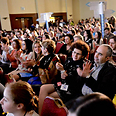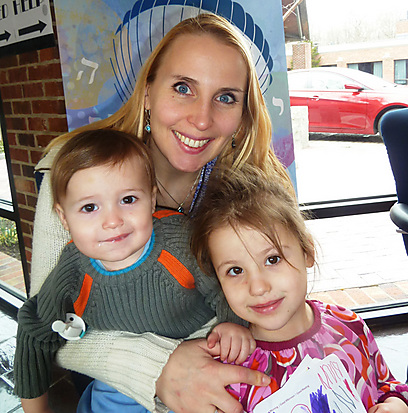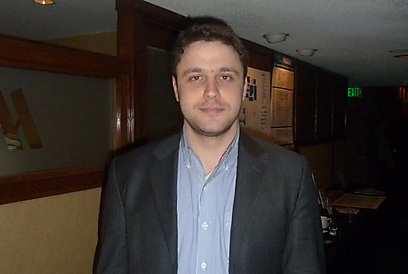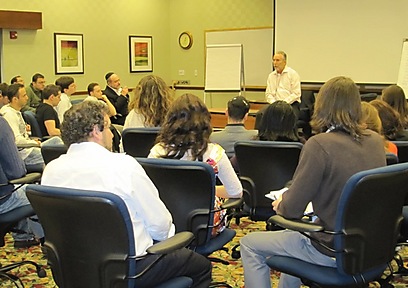
America's silent Jews
What happened to former Soviet Jews who immigrated to US 25 years ago? Ynet correspondent attends Limmud FSU conference in Princeton, tries to find out why despite looking for ways to connect to Jewish identity, they have distinguished themselves from Jewish American society
Known as the "silent Jewry," most of these Jews were immigrated either to Israel or North America: One in five Israelis and one in seven North American Jews today emigrated from the USSR. In Israel they managed, within a relatively short time, to have an impact on all the areas – economically, socially and politically, integrating into senior roles in the Israeli economy and leadership.
Yet in North America there is an entirely different parallel society. Although educated and aiming to succeed, they are not pursuing leadership. This society is connected to its Jewish roots more than ever and is looking for ways to connect to its Jewish identity, while distinguishing itself from the Jewish American society.
Don't want to be second-class citizens
Nearly 800 Jews from all over North America paid $250 for a weekend of Jewish identity near the university town of Princeton, organized by the Limmud FSU organization. The event was held especially for former Eastern Europeans, distinct and separate from the general Limmud, which was held a short while earlier for New York's Jews.
"The Jews who came here from Russia are of a special race," says Chaim Chessler, one of the Limmud FSU founders. "They are deeply rooted in Judaism and tradition, and are unwilling to feel inferior compared to Jews in New York. They don't want to be second-class citizens.
"They didn't agree to come to Limmud NY because they felt like foreigners there, although they were offered financial assistance. They didn't go there because they were not offered a true partnership. They were asked to join out of a position of patronage, and as far as they are concerned – they already had that in Russia."

Dr. Olga Segal, one of conference participants (Photo: Liron Nagler-Cohen)
These words summarize the overall feelings of inferiority sizzling below the surface. In a questionnaire handed out to the hundreds of conference participants, 60% of them admitted that they did not feel part of the US Jewry, but 73% defined their identity first and foremost as Jewish.
Many of the conference participants and speakers admitted that Russia's Jews aspire to excel wherever they are – in Israel as well as in North America, presenting academic and economic success, as well as social assimilation in the general space they live in.
They came to Limmud for different reasons: To be with other Jews like themselves, to try to understand what their Jewish identity means to them – or to find a match.
Want to influence, just don't know how
Leo Hayat, 29, who was born in Belarus, belongs to all categories. He left to the United States as a child. His grandfather was religious and even wrote 11 books in Yiddish, but his father is no longer religious. When the gates opened in 1989, he decided to take his family to a country with no military service.
Hayat grew up in Kansas, and was admitted into the prestigious Yale University, where he studied business administration.
He came to Princeton to find a Jewish bride ("I have no idea why it means so much to me"), but found himself speaking passionately against the detachment of the American Jewish society from its brothers who emigrated from Eastern Europe.
"I go to all the economic Jewish conventions, but can't find other people who share my background there," Hayat says. "One in seven Jews here comes from the former Soviet Union, but somehow none of them is a rabbi and none of them speaks at Jewish organizations or federations, and there are several hundreds of those every year."

'I can't find people with my background.' Leo Hayat (Photo: Liron Nagler-Cohen)
Hayat attributes this phenomenon to the effect of immigration: "They came here literally without anything, and then they were mainly busy surviving. But their children who already grew up here don't want to make an impact, because their parents never told them they should do so.
"You sit in business administration classes with very good schoolmates, and discover that they have billionaire parents who donated to the organizations that saved your life. Your parents had maybe several hundreds of dollars – and their parents donated hundreds of thousands of dollars so that you could come here.
"Many times you are better than them, but they have something you don't: Parents who know what's what, connections and knowledge. They know how things work, and so they can be perfect idiots and not go to college, but they have the knowledge. And what are you supposed to do with your good grades? You have no idea."
Hayat is trying to change the situation, speaking at key Jewish conferences, and is even considering "seriously" making aliyah.
"We all grew up in families in which our parents raised us as Jews, but warned us not to tell anyone about it so that we don’t get hurt," he says. "To this day my parents don't talk. They are very private people. That's something that stays with you."
Like other participants in Limmud FSU, Hayat tries to fill every hour with a lecture or symposium, thanks to a well-planned timetable and a panel of lecturers from all parts of the US Jewish spectrum, with a glance toward Israel.
During the entire event, it was quite common to see groups of young Jews – most of them aged 18-30 – gathered around a piano singing songs of yearning in Russian, alongside Zionist Israeli songs. I heard "Hatikva" more than once there.
More connected to Judaism than Israelis
Among the many speakers were prominent US Rabbis Marc Schneier and Shmuley Boteach, Jewish intellectual Dima Zicer, Parliament Member Irwin Cotler of Canada (a country which sent many Jewish representatives to the conference), former Prisoner of Zion Yuli Kosharovsky, and senior Jewish figures like NCSJ Executive Director Mark Levin and B'nai B'rith Executive Vice President Daniel Mariaschin.
Guests from Israel included President Shimon Peres' advisor, Yoram Dori, who managed to fill a lecture hall with young Jews interested in Israel-US relations.

Diaspora strengthens Jewish identity (Photo: Batya Dori)
"The connection of the young people here to their Jewish identity is greater than the connection of their counterparts in Israel," says Chessler, and this assumption appears to be accepted by most of the people we spoke to. "Their attitude towards the Jewish tradition is deeper and more rooted, because the American framework allows them to choose the type of Judaism they want."
Irina Gaister, 30, arrived in Israel from Belarus at the age of six, and immigrated to the US at 17. "In New York it's hard to find people like us," she says. "Most of my friends are not even Jewish, and it's nice for me to meet Jewish people like me, especially when most of my Jewish friends today are actually from South America.
"I work hard on my Jewishness here. In Israel I didn't care if I ate kosher or not, and here I try to observe kashrut. In New York it's very easy to lose your identity, so I feel I have to go out of my way to remember where I came from."
Rabbi Schneier: It's a matter of time
Rabbi Marc Schneier, who is often referred to as the "celebrities' rabbi" and is the rabbi of two leading Orthodox synagogues in the state of New York, believes that the freedom to be a Jew in the US is also the freedom to leave Judaism.
According to him, US Jews have the responsibility to connect to their Jewish identity and to the Jewish people, thus attending conferences which people their age in Israel wouldn't dream of going to.
"The masses of USSR Jews who arrived here changed the demographic, political and socioeconomic reality of the New York Jewry," he says. "And the more they settle here, the more they advance to positions of influence. It's a process reminiscent of the one undergone by the group of Holocaust survivors who arrived in the US and became influential and dominant within just two generations.
"People must be patient and earn their status within the Jewish community. I predict that within 25 years the American Jews who came from Russia will have an influence not only in New York, but in the entire country."
Complex identity
Dima Zicer, a sort of celebrity among the conference goers, divides his time between Israel and St. Petersburg. The Jewish identity workshop he hosted in Russia was so crowded that it was difficult to get in. Zicer, an educator and intellectual, believes that the Diaspora strengthens Jewish identity as well.
"In the past three years in which I have been living in St. Petersburg, I make certain to visit the synagogue during the holidays," he says. "When I lived in Israel I didn't even go once."
According to Zicer, because of the many years of religious detachment experienced by Jews in the USSR, today they are searching for a deeply rooted connection to their identity.
"One rabbi told me about the strongest Passover he had in his live: He was 17 or 18 and was at a transit camp in Italy," says Zicer. "He really wanted to celebrate Passover, but he had no idea how to do it. So he and his friend went to a store, bought bread and a bottle of vodka and celebrated Passover. In terms of his intentions, it was the most Jewish holiday he had in his life."
"On the one hand, I am a Jew from all directions and generations, and we celebrated Passover with matzah, bitter herbs and bread – because we had no idea and we didn't know a word from the Haggadah. We only knew that there was a holiday we had to celebrate, and as far as intentions go I am not sure it's lesser than the strictest Passover I celebrated in Israel."
Zicer believes that the USSR Jews who arrived in Israel live feel that they have no reason to make any effort in terms of their Jewishness.
"The guys here have a complex identity: Who am I? Russian? Jewish? American? There is quite a lot of brainwashing here that if you observe mitzvot then you are Jewish – and then you should just observe all of them, but that way you lose two-thirds of these guys."
'Uncomfortable to discuss their Jewishness'
Zicer says that in the workshop he gave, he asked the religious participants to raise their hands. Out of a full room – only two responded. He says that former USSR Jews in the US choose their way "out of the many options offered by Jewish civilization."
He tells us about a local American theater group established by former USSR Jews, including his daughter, which engages in maintaining a connection to Jewish culture. "The Russians' Jewish identity is an identity of people who are searching – and therefore they also have a chance to find it. Those who were born in Israel and are not searching – will not find either."
One of the two women who raised their hands at Zicer's workshop was Dr. Olga Segal, 30, a neurologist at a New York state prison. She was born in St. Petersburg and arrived in the US to study as a young girl, and was educated in American religious systems. This is the second year she attends the conference together with her husband, a religious doctor himself, and her four children.
"I am busy with work and I don't have time for myself," she says. "I really like this conference, which combines wonderful lectures and wonderful people. Most of the people here arrived as refugees with their parents, I didn't. They have backing, I don't. So this is how I am connected to this community."
Segal believes that most former USSR Jews in the US are "proud to be Jewish." Yet their voice is unheard because they "identify with their Jewishness in a quiet way. They will only discuss it in their closed community, but not outside. After 70 years of communism, they still feel uncomfortable talking about their Jewishness in public."










